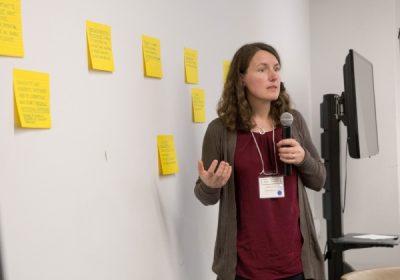by Magda Goemans, CFICE Evaluation and Analysis Working Group Research Assistant
This blog post is one of several that will take a look at some of the inspiration behind recommendations that CFICE is developing for funders, post-secondary institutions and others following our evaluation of Phase I of the project. I have spent the last few years as a research assistant with CFICE as I continue with my doctoral studies in the department of Geography and Environmental Studies at Carleton, so it makes sense for me to consider how recommendations for students link with my own CFICE experience. One recommendation in particular, that,
students should seek out opportunities to develop longer-term CCE projects, alliances and networks
reminds me of an opportunity that came about through my work with my CFICE community partner, Sustainable Living Ottawa East (SLOE).
SLOE was formed by residents living in the central Ottawa neighbourhood of Old Ottawa East. The group aims to influence greater environmental and social sustainability measures within a large-scale residential infill project that is coming to their neighbourhood. They have worked toward this effort by assembling information on a variety of sustainability options to present to the project’s developer (for example, considering opportunities to install a district energy system for the development, as well as strategies to increase the proportion of affordable housing for new residents).
I worked with SLOE as a research assistant (RA) over a three-year period within the Community Environmental Sustainability hub of CFICE. Over that time, I provided administrative and research support to the group, by maintaining their email list and file storage system, and by helping to assemble a report of researched sustainability options for the development project. I also helped to organize a large forum presented by SLOE that brought together sustainable development and planning experts from across Ottawa and beyond.
During the last year-and-a-half of the RAship, I began to work more closely with a new group that was initiated by SLOE members, to advocate for the development of seniors’ housing on the Old Ottawa East development site. This group, which came to be known as Convivium Cohousing for Seniors, continued to attract new membership and soon took on a life of its own as potential residents for cohousing in the neighbourhood began to form their own ideas about how to design and manage this type of community. As I had done with SLOE in previous years, I helped set up organizational and communication support for this new group. I also assisted the group in putting together two workshops that allowed members to consider design and financing options for the proposed cohousing community (and helped members get to know each other better too!).
As a doctoral student exploring climate change adaptation issues, the RAship with Convivium exposed me to new research directions, in particular those connected to seniors and affordable housing concerns. Within this environment, I gained greater confidence in the skills I had honed as an RA, including in such areas as report writing and workshop planning. This process also allowed me to gain a greater understanding of members’ perspectives and preferred strategies in reaching social sustainability advocacy goals. Most significantly, I formed relationships with a dynamic and engaged group of older adults, and linked to a network of individuals that I would never have otherwise encountered, including affordable housing experts and community developers with the local community health centre. I was eager to build on these relationships, and to learn more about how I could contribute to this work.
When the CFICE RAship officially came to an end, the Convivium group was still in the process of coming together, and its members still had a lot of work to do. One of the next goals for members was to think about options that would allow residents to exchange supportive services with one another within their proposed housing community (e.g. by leading yoga classes, or offering friendly daily check-ins with neighbours). Convivium members contacted me and offered an additional research contract to assemble a report on supportive services options for seniors in the area, which I happily accepted and completed a few months later.
As Convivium moves forward in achieving its cohousing goals, I have maintained contact with members, and take on additional modest tasks for the group every now and again. I am grateful that I have been able to contribute to such a meaningful initiative, which has broadened my research interests and allowed me to publish some of the personal insights coming out of this experience. Considering my background in climate change adaptation/resilience research, I wasn’t really sure at first how my participation in this effort might link to my own research pursuits. Along the way, I discovered how much I have learned from this group, as Convivium is fostering a different form of resilience within a social sustainability context – this kind of resilience is based on trusting relationships, reciprocal caregiving, and progressive views around aging in community.
